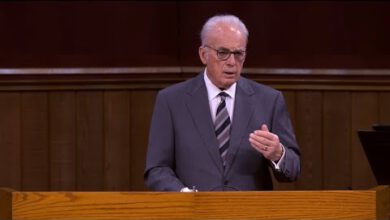When God Abandons a Nation (Romans 1:18-32)
In today’s discussion, we turn to a well-known passage from Scripture, especially for those familiar with the Bible. We’ll look at Romans chapter 1, starting from verse 18 and continuing through the chapter’s conclusion. To set the stage for this important truth, let’s focus on the first verse. Romans 1:18 states: “For the wrath of God is revealed from heaven against all ungodliness and unrighteousness of men who suppress the truth in unrighteousness.”
This passage centers on the wrath of God—an uncomfortable subject for many, not only in the world but even within the church. However, understanding God’s wrath is crucial to grasping the full message of the gospel. There are several different facets to God’s wrath.
First, there is eternal wrath—the punishment God imposes on unbelieving sinners in hell, which is everlasting. The Bible frequently references this form of wrath. Then, there is eschatological wrath, which refers to the divine judgment at the end of the world, as described by Old Testament prophets, Jesus Christ in His Olivet Discourse, and clearly outlined in the book of Revelation.
Another form is cataclysmic wrath, which manifests through natural disasters such as tsunamis, volcanoes, hurricanes, earthquakes, or tragic events like the September 11 attacks. These catastrophic events reflect God’s judgment on the world.
Next, we have consequential wrath. This is the result of the choices we make—the principle of sowing and reaping. When we live a certain way, we set in motion forces that lead to judgment. Lastly, there is the wrath of abandonment, the focus of this passage. This wrath occurs when God withdraws His presence from a society.
A tragic example of this can be found in the story of Samson, the strongest man who ever lived. In Judges 16:18-21, we read that Delilah betrayed Samson, and after she shaved off his hair, she began to inflict him with weakness. He did not realize that the Lord had left him. The Philistines captured him, gouged out his eyes, and imprisoned him. This was the result of Samson’s sin—God had abandoned him, demonstrating the wrath of abandonment.
In Judges 10, God tells the Israelites, “You have forsaken Me and served other gods; therefore, I will deliver you no more. Cry out to the gods you’ve chosen; let them deliver you in your distress.” This is God’s judgment of abandonment.
A similar message is found in Proverbs 1:24-31, where God says, “Because I called and you refused, I stretched out My hand, but no one paid attention. Since you rejected My counsel and didn’t accept My correction, I will laugh at your calamity. I will mock when your fear comes, like a storm, and your distress like a whirlwind. When they call on Me, I will not answer; they will seek Me, but will not find Me.”
God reaches a point where He allows people to face the consequences of their sinful choices. As Hosea 4:17 says, “Ephraim is joined to idols, let him alone.” There comes a time when God lets individuals go, allowing them to experience the outcomes of their decisions. When people reject God’s guidance, they must live with the results of their own choices.
Lastly, in the case of the Pharisees, Jesus says, “Let them alone, they are blind guides,” signifying a point where divine patience ends. God’s abandonment, as painful as it is, serves as a solemn reminder of the importance of seeking God’s will and responding to His guidance.
